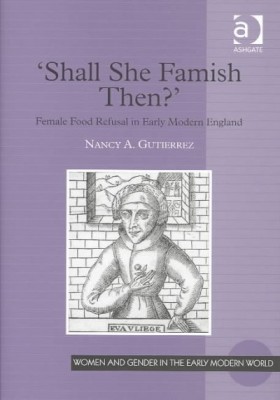| 'Shall She Famish Then?': Female Food Refusal in Early Modern England Contributor(s): Gutierrez, Nancy A. (Author) |
|
 |
ISBN: 1840142405 ISBN-13: 9781840142402 Publisher: Routledge OUR PRICE: $113.85 Product Type: Hardcover - Other Formats Published: September 2003 |
| Additional Information |
| BISAC Categories: - Literary Criticism | Comparative Literature - Literary Criticism | English, Irish, Scottish, Welsh |
| Dewey: 820.935 |
| LCCN: 2002036807 |
| Series: Women and Gender in the Early Modern World |
| Physical Information: 0.75" H x 8.94" W x 8.62" (0.79 lbs) 160 pages |
| Themes: - Cultural Region - British Isles |
| Descriptions, Reviews, Etc. |
| Publisher Description: Nancy Gutierrez's exploration of female food refusal during the early modern period contributes to the ongoing conversation about female subjectivity and agency in a number of ways. She joins such scholars as Gail Kern Paster, Jonathan Sawday, and Michael Schoenfeldt, who locate early modern ideas of selfhood in the age's understanding of the body and bodily functions, that is, the recognition that behavior and feelings are a result of the internal workings of the body. Exploring the portrayals of the anorectic woman in the work of Ford, Shakespeare, Heywood and others and arguing that the survival of these women undermines regulatory policies exercised over them by those in authority, Gutierrez here demonstrates how female food refusal is a unique demonstration of individuality. The chapters of this book reveal how the common cultural association of women and food manifests itself in the early modern period-not as religious expression, which is the medieval representation, and not as an expression of dysfunctional adolescence and maturation, our own contemporary view, but rather as a trope in which the female body is a site of political apprehension and cultural change. This study is neither a history nor a survey of the anorectic female body in early modern England, but rather individual yet related discussions in which the starved female body is seen to signify certain (un)expressed tensions within the culture. |